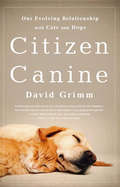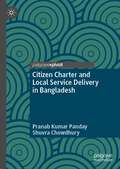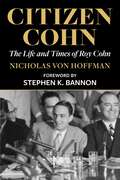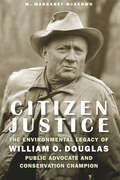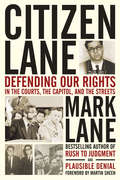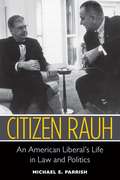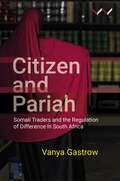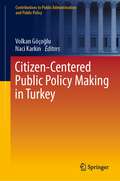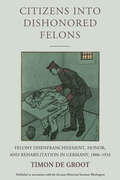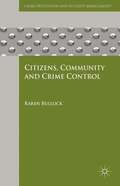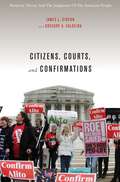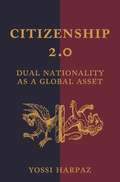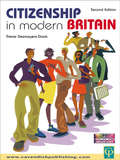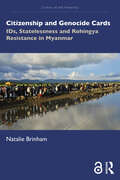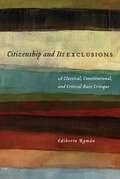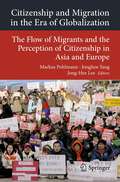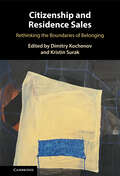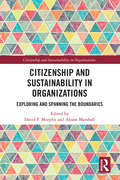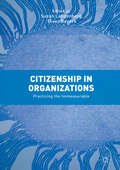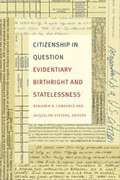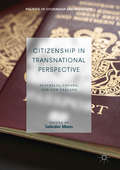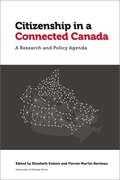- Table View
- List View
Citizen Canine: Our Evolving Relationship with Cats and Dogs
by David GrimmDogs are getting lawyers. Cats are getting kidney transplants. Could they one day be fellow citizens?Cats and dogs were once wild animals. Today, they are family members and surrogate children. A little over a century ago, pets didn't warrant the meager legal status of property. Now, they have more rights and protections than any other animal in the country. Some say they're even on the verge of becoming legal persons.How did we get here-and what happens next?In this fascinating exploration of the changing status of dogs and cats in society, pet lover and award-winning journalist David Grimm explores the rich and surprising history of our favorite companion animals. He treks the long and often torturous path from their wild origins to their dark days in the middle ages to their current standing as the most valued animals on Earth. As he travels across the country-riding along with Los Angeles detectives as they investigate animal cruelty cases, touring the devastation of New Orleans in search of the orphaned pets of Hurricane Katrina, and coming face-to-face with wolves and feral cats-Grimm reveals the changing social attitudes that have turned pets into family members, and the remarkable laws and court cases that have elevated them to quasi citizens.The journey to citizenship isn't a smooth one, however. As Grimm finds, there's plenty of opposition to the rising status of cats and dogs. From scientists and farmers worried that our affection for pets could spill over to livestock and lab rats to philosophers who say the only way to save society is to wipe cats and dogs from the face of the earth, the battle lines are being drawn. We are entering a new age of pets-one that is fundamentally transforming our relationship with these animals and reshaping the very fabric of society.For pet lovers or anyone interested in how we decide who gets to be a "person" in today's world, Citizen Canine is a must read. It is a pet book like no other.
Citizen Charter and Local Service Delivery in Bangladesh
by Pranab Kumar Panday Shuvra ChowdhuryThis book illuminates the importance of the citizen charter (CC) in local service delivery in Bangladesh. It describes how CC was implemented into the service delivery process and its impact. In the 1970s, the transition from traditional public administration to new public management was inspired by globalization, the emergence of an information and technological society, and many economic theories, such as public choice, principal-agent theory, and transaction cost. The purpose of the government in a welfare state is to serve the citizens by providing essential services. However, public service delivery in most developing nations is ineffective owing to corruption, waste of public funds, a lack of responsibility on the part of public employees, etc. In this context, CC emerged as a means of educating individuals on many elements of services, so they may hold service providers accountable. Thus, the issue of framing and implementation of CC has been put in place due to the persistent pressing of academicians, politicians, and practitioners advocating for better local service delivery.
Citizen Cohn: The Life and Times of Roy Cohn
by Nicholas von HoffmanNo one so famous or controversial led so many secret lives. Loathed by some, and well respected by others, Roy Cohn was known as the toughest and most brilliant lawyer in America. From his role in the Rosenberg trial and as chief counsel to Senator Joseph McCarthy through his extraordinary friendship with J. Edgar Hoover and his vendetta against Robert Kennedy, Cohn's reputation grew larger than life. Presidents, celebrities, gangsters, judges, and endless politicians crossed Cohn&’s path, either as friend or foe, including J. Edgar Hoover, Senator Joseph McCarthy, Julius and Ethel Rosenberg, Ronald Reagan, Robert Kennedy, Barbara Walters, Fat Tony Salerno, Louis Nizer, Si Newhouse, Rupert Murdoch, George Steinbrenner, Donald Trump, and many more. Cohn was the target of numerous indictments and haunted by professional misconduct charges which led to his disbarment shortly before his death. His private life, even more outrageous than his life known to the public, constantly had his name in gossip columns; there were his lovers, his denial of his homosexuality and AIDS diagnosis, and finally his death from AIDS-related cancer in 1986. Nicolas von Hoffman has created a remarkable and provocative biography of a complex life that was driven by power. Interviewing family members, colleagues, clients, friends, and lovers, he gives an extraordinary portrait of the man, his ideological passion, and the patterns of power and money that made him, in the end, one of the most influential men in our society. From hidden bank accounts, numerous incidents of political fixing, and surprising connections, Citizen Cohn reveals the real Roy Cohn.
Citizen Justice: The Environmental Legacy of William O. Douglas—Public Advocate and Conservation Champion
by Hon. M. Margaret McKeownU.S. Supreme Court Justice William O. Douglas was a giant in the legal world, even if he is often remembered for his four wives, as a potential vice-presidential nominee, as a target of impeachment proceedings, and for his tenure as the longest-serving justice from 1939 to 1975. His most enduring legacy, however, is perhaps his advocacy for the environment. Douglas was the spiritual heir to early twentieth-century conservation pioneers such as Teddy Roosevelt and John Muir. His personal spiritual mantra embraced nature as a place of solitude, sanctuary, and refuge. Caught in the giant expansion of America&’s urban and transportation infrastructure after World War II, Douglas became a powerful leader in forging the ambitious goals of today&’s environmental movement. And, in doing so, Douglas became a true citizen justice. In a way unthinkable today, Douglas ran a one-man lobby shop from his chambers at the U.S. Supreme Court, bringing him admiration from allies in conservation groups but raising ethical issues with his colleagues. He became a national figure through his books, articles, and speeches warning against environmental dangers. Douglas organized protest hikes to leverage his position as a national icon, he lobbied politicians and policymakers privately about everything from logging to highway construction and pollution, and he protested at the Supreme Court through his voluminous and passionate dissents. Douglas made a lasting contribution to both the physical environment and environmental law—with trees still standing, dams unbuilt, and beaches protected as a result of his work. His merged roles as citizen advocate and justice also put him squarely in the center of ethical dilemmas that he never fully resolved. Citizen Justice elucidates the why and how of these tensions and their contemporary lessons against the backdrop of Douglas&’s unparalleled commitment to the environment.
Citizen Lane: Defending Our Rights in the Courts, the Capitol, and the Streets
by Martin Sheen Mark Lane"A fascinating memoir . . . well documented, dramatic, and brilliantly crafted." --Robert K. Tanenbaum, first deputy counsel, congressional investigation committee on JFK assassination Freedom Rider, friend of Eleanor Roosevelt, Dick Gregory's vice-presidential running mate, legal defense at Wounded Knee, survivor of the Jonestown Massacre--Mark Lane has been inspiring social consciousness, influencing history makers, and inciting controversy for more than six decades. In Citizen Lane he tells the story of his remarkable life, demonstrating how a single dedicated individual can fight for the underdog, provoke the establishment, and trigger change. From the streets to the courtroom, he has been on the front lines in the events that shaped a generation in opposition to government excesses and war. Icons of the American political and social landscape appear throughout his narrative as Lane's cohorts and companions and as his vicious opponents. Radical leaders embraced him; the FBI and CIA tried to destroy him. No one who dealt with him had a neutral reaction to his forceful, opinionated, larger-than-life persona. Entertaining and enlightening, this autobiography confirms that one person can make a difference and change the lives of millions by holding to his principles regardless of the consequences. Mark Lane is a lawyer, a former member of the New York State legislature, an author, and an activist. He is the bestselling author of Rush to Judgment and Plausible Denial. He lives in Charlottesville, Virginia. Martin Sheen is a distinguished actor, an activist, and the recipient of many awards, including the Laetare Medal, the most prestigious honor for an American Catholic.
Citizen Rauh: An American Liberal's Life in Law and Politics
by Michael E. ParrishNo lawyer in the post-1945 era did more to protect the economic interests of working-class Americans than Rauh, who fought for the unions as they struggled for legitimacy and against them when they betrayed their own members. No lawyer stood more courageously against repressive anticommunism during the 1950s or advanced the cause of racial justice more vigorously in the 1960s and 1970s. No lawyer did more to defend the constitutional vision of the Warren Court and resist the efforts of Richard Nixon and Ronald Reagan to undo its legacy. Throughout his life, Rauh continued to articulate a progressive vision of law and politics, ever confident that his brand of liberalism would become vital once again when the cycle of American politics took another turn.
Citizen Rights, Migrant Rights and Civic Stratification
by Lydia MorrisThis book explores the concept of civic stratification and examines its contemporary relevance for analysis and understanding of the functioning of rights in society.David Lockwood’s (1996) concept of civic stratification outlines the way in which the rights associated with citizenship can be a source of inequality by virtue of their formal granting or denial by the state, or by informal impediments to their full realisation. The purpose of this book is to explore the meaning and significance of this concept, and elaborate its potential in offering a framework for understanding the dynamic nature of rights. Lockwood’s model reverses Marshall’s (1950) view of citizenship as guaranteed inclusion in society and is linked to the way that the differential entitlement and the qualifying conditions associated with certain rights can be harnessed as a means of control. While both Marshall and Lockwood were principally concerned with the rights attaching to citizenship, this book extends the insights of these two authors to show how such controls apply in various ways to both citizens and non-citizens alike. Building on Lockwood’s conception of ‘moral resources’ the book set out a theoretical framework and empirical illustration of how the position of different groups within society is subject to shifting perceptions of social worth and is engaged both in claims to fuller access to rights and in justifications of their denial or removal.This book will appeal to scholars and higher-level students with relevant interests in sociolegal studies, sociology, social policy and politics.The Open Access version of this book, available at www.taylorfrancis.com, has been made available under a Creative Commons Attribution-NoDerivatives (CC-BY-ND) 4.0 license. This publication was supported by the University of Essex’s open access fund.
Citizen and Pariah: Somali Traders and the Regulation of Difference in South Africa
by Vanya GastrowCitizen and Pariah explores the fragility of law, pluralism and democracy in South Africa by investigating Somali informal shopkeepers’ experiences of crime, justice and regulation in the country. Through a narrative account of their local experiences, the book sheds light on the legal and political predicaments they face.
Citizen-Centered Public Policy Making in Turkey (Contributions to Public Administration and Public Policy)
by Volkan Göçoğlu Naci KarkinThis edited volume discusses direct citizen participation and public policymaking in Turkey. Written by a diverse group of scholars and practitioners, this book advances the field of public policy by critically examining whether and how direct citizen participation may add value to government business. Structurally, the book focuses on the core topics of public administration, the generation of public services, the design and implementation of public policies, citizens and networks, new business models, and local perspectives. Using Turkey as a case study, this volume fills a gap in the literature and will appeal to researchers interested in public policy in the MENA context.
Citizens Divided
by Robert C. PostThe Supreme Court's 5-4 decision in Citizens United v. Federal Election Commission, which struck down a federal prohibition on independent corporate campaign expenditures, is one of the most controversial opinions in recent memory. Defenders of the First Amendment greeted the ruling with enthusiasm, while advocates of electoral reform recoiled in disbelief. Robert Post offers a new constitutional theory that seeks to reconcile these sharply divided camps. Post interprets constitutional conflict over campaign finance reform as an argument between those who believe self-government requires democratic participation in the formation of public opinion and those who believe that self-government requires a functioning system of representation. The former emphasize the value of free speech, while the latter emphasize the integrity of the electoral process. Each position has deep roots in American constitutional history. Post argues that both positions aim to nurture self-government, which in contemporary life can flourish only if elections are structured to create public confidence that elected officials are attentive to public opinion. Post spells out the many implications of this simple but profound insight. Critiquing the First Amendment reasoning of the Court in Citizens United, he also shows that the Court did not clearly grasp the constitutional dimensions of corporate speech. Blending history, constitutional law, and political theory, Citizens Divided explains how a Supreme Court case of far-reaching consequence might have been decided differently, in a manner that would have preserved both First Amendment rights and electoral integrity.
Citizens into Dishonored Felons: Felony Disenfranchisement, Honor, and Rehabilitation in Germany, 1806-1933 (Studies in German History #28)
by Timon De GrootOver the course of its history, the German Empire increasingly withheld basic rights—such as joining the army, holding public office, and even voting—as a form of legal punishment. Dishonored offenders were often stigmatized in both formal and informal ways, as their convictions shaped how they were treated in prisons, their position in the labour market, and their access to rehabilitative resources. With a focus on Imperial Germany’s criminal policies and their afterlives in the Weimar era, Citizens into Dishonored Felons demonstrates how criminal punishment was never solely a disciplinary measure, but that it reflected a national moral compass that authorities used to dictate the rights to citizenship, honour and trust.
Citizens, Community and Crime Control
by Karen BullockAnalysing the historical circumstances and theoretical sources that have generated ideas about citizen and community participation in crime control, this book examines the various ideals, outcomes and effects that citizen participation has been held to stimulate and how these have been transformed, renegotiated and reinvigorated over time.
Citizens, Courts, and Confirmations: Positivity Theory and the Judgments of the American People
by James L. Gibson Gregory A. CaldeiraIn recent years the American public has witnessed several hard-fought battles over nominees to the U.S. Supreme Court. In these heated confirmation fights, candidates' legal and political philosophies have been subject to intense scrutiny and debate. Citizens, Courts, and Confirmations examines one such fight--over the nomination of Samuel Alito--to discover how and why people formed opinions about the nominee, and to determine how the confirmation process shaped perceptions of the Supreme Court's legitimacy. Drawing on a nationally representative survey, James Gibson and Gregory Caldeira use the Alito confirmation fight as a window into public attitudes about the nation's highest court. They find that Americans know far more about the Supreme Court than many realize, that the Court enjoys a great deal of legitimacy among the American people, that attitudes toward the Court as an institution generally do not suffer from partisan or ideological polarization, and that public knowledge enhances the legitimacy accorded the Court. Yet the authors demonstrate that partisan and ideological infighting that treats the Court as just another political institution undermines the considerable public support the institution currently enjoys, and that politicized confirmation battles pose a grave threat to the basic legitimacy of the Supreme Court.
Citizenship 2.0: Dual Nationality as a Global Asset (Princeton Studies in Global and Comparative Sociology)
by Yossi HarpazCitizenship 2.0 focuses on an important yet overlooked dimension of globalization: the steady rise in the legitimacy and prevalence of dual citizenship. Demand for dual citizenship is particularly high in Latin America and Eastern Europe, where more than three million people have obtained a second citizenship from EU countries or the United States. Most citizenship seekers acquire EU citizenship by drawing on their ancestry or ethnic origin; others secure U.S. citizenship for their children by strategically planning their place of birth. Their aim is to gain a second, compensatory citizenship that would provide superior travel freedom, broader opportunities, an insurance policy, and even a status symbol.Drawing on extensive interviews and fieldwork, Yossi Harpaz analyzes three cases: Israelis who acquire citizenship from European-origin countries such as Germany or Poland; Hungarian-speaking citizens of Serbia who obtain a second citizenship from Hungary (and, through it, EU citizenship); and Mexicans who give birth in the United States to secure American citizenship for their children. Harpaz reveals the growth of instrumental attitudes toward citizenship: individuals worldwide increasingly view nationality as rank within a global hierarchy rather than as a sanctified symbol of a unique national identity.Citizenship 2.0 sheds light on a fascinating phenomenon that is expected to have a growing impact on national identity, immigration, and economic inequality.
Citizenship In Modern Britain
by Trevor Desmoyers-DavisCitizenship in Modern Britain is a readable text that examines citizenship from a social science perspective. The subject matter has been divided into three sections,corresponding to each of the AQA AS Level modules. The text also provides all the necessary academic material required for examinable citizenship courses, supported and developed by a series of research, practical and discursive activities. These activities have been designed not only extend to students’ knowledge of the subject, but also to encourage thought, debate and evaluation. This book is essential for students taking AS level Citizenship. It also provides excellent support for students who are studying subjects that have close links to citizenship issues such as sociology, law, Government and politics and general studies.
Citizenship and Genocide Cards: IDs, Statelessness and Rohingya Resistance in Myanmar (Crimes of the Powerful)
by Natalie BrinhamThis book draws on Rohingya oral histories and narratives about Myanmar’s genocide and ID schemes to critique prevailing international approaches to legal identities and statelessness. By centring the narratives of survivors of state crimes, collected in the aftermath of the 2017 genocidal violence, this book examines the multiple uses of state-issued ID cards and registration documents in producing statelessness and facilitating genocide. In doing so, it challenges some of the international solutions put forward to resolve statelessness.Rohingya narratives disrupt a simple linear understanding of documenting legal identity that marginalises experiences of these processes. The richly layered accounts of the effects of citizenship laws and registration processes on the lives of Rohingya problematise the ways in which international actors have endorsed state ID schemes and by-passed state-led persecution of the group. This book will be valuable for scholars studying global criminology, state crime, development studies, refugee and migration studies, statelessness and nationality, citizenship studies, and genocide studies.The Open Access version of this book, available at www.taylorfrancis.com, has been made available under a Creative Commons Attribution (CC-BY) 4.0 license.
Citizenship and Its Exclusions: A Classical, Constitutional, and Critical Race Critique (Critical America #55)
by Ediberto RománCitizenship is generally viewed as the most desired legal status an individual can attain, invoking the belief that citizens hold full inclusion in a society, and can exercise and be protected by the Constitution. Yet this membership has historically been exclusive and illusive for many, and in Citizenship and Its Exclusions, Ediberto Román offers a sweeping, interdisciplinary analysis of citizenship’s contradictions.Román offers an exploration of citizenship that spans from antiquity to the present, and crosses disciplines from history to political philosophy to law, including constitutional and critical race theories. Beginning with Greek and Roman writings on citizenship, he moves on to late-medieval and Renaissance Europe, then early Modern Western law, and culminates his analysis with an explanation of how past precedents have influenced U.S. law and policy regulating the citizenship status of indigenous and territorial island people, as well as how different levels of membership have created a de facto subordinate citizenship status for many members of American society, often lumped together as the “underclass.”
Citizenship and Migration in the Era of Globalization: The Flow of Migrants and the Perception of Citizenship in Asia and Europe (Transcultural Research – Heidelberg Studies on Asia and Europe in a Global Context #5)
by Jong-Hee Lee Markus Pohlmann Jonghoe YangIn an age of globalization there is frequent migration across national borders, resulting in a reconsideration of the notion, practice and social institution of national citizenship. Addressing this phenomenon, the book focuses on the exchange between, and responses, of Korea and Germany. In particular, the book deals extensively with citizenship in Korea where the concept of citizenship is young, and thus the study of citizenship is relatively scarce. This book may be the first of its kind, bringing together eminent Korean and German scholars to analyse various aspects of citizenship in Korea. It is hoped that it will contribute to scholarship in the fields of citizenship and migration and to an understanding of the flow of people and ideas between Asia and Europe.
Citizenship and Residence Sales: Rethinking the Boundaries of Belonging
by Kristin Surak Dimitry KochenovCitizenship and residence by investment is a fast-growing global phenomenon. As of 2022, more than a third of all countries in the world offered paths to membership in exchange for a donation or investment into their economies. Yet we know little about how these programmes operate and debates in academia and the wider public are often misinformed by sensationalist cases. This book offers a multidisciplinary exploration of both citizenship and residence by investment on a global scale. Bringing together the expertise of leading legal scholars, economists, sociologists, political scientists, and historians, it provides an informative and empirically grounded assessment of the origins, operation, key causes, and the legal bases of the investment migration programmes. By so doing, the volume demystifies citizenship and residence by investment and takes a critical postcolonial global perspective, addressing key issues in belonging, exclusion, and inequality that define the world today.
Citizenship and Sustainability in Organizations: Exploring and Spanning the Boundaries (Citizenship and Sustainability in Organizations)
by David F. Murphy; Alison MarshallCitizenship and Sustainability in Organizations: Exploring and Spanning the Boundaries is the introductory book in the series of the same name and draws upon new conceptual thinking from some of the leading contributors to The Journal of Corporate Citizenship on topics of social responsibility, organizational citizenship, influencing and leading change for sustainability and individual agency. Chapter authors are influential thinkers, pushing the boundaries of conventional thinking about corporate citizenship and sustainability to generate inovative ideas, models and practices. The book’s core message is that the contexts within which organizations and individuals act are undergoing significant change and disruption. Existing corporate social responsibility (CSR), corporate citizenship and business sustainability models and frameworks need to be adapted, abandoned or transformed. This book represents a starting point for dialogue about these challenges and presents commentaries, debates, essays and insights that aim to be provocative and engaging, raise some of the important issues of the day and provide observations on what may be too new yet to be the subject of detailed empirical and theoretical studies. The book is aimed at researchers, students and practitioners in the fields of corporate citizenship, sustainability, CSR, business ethics, corporate governance and critical management and leadership studies.
Citizenship as Foundation of Rights
by Richard SobelCitizenship as Foundation of Rights explores the nature and meaning of American citizenship and the rights flowing from citizenship in the context of current debates around politics, including immigration. The book explains the sources of citizenship rights in the Constitution and focuses on three key citizenship rights - the right to vote, the right to employment, and the right to travel in the US. It explains why those rights are fundamental and how national identification systems and ID requirements to vote, work and travel undermine the fundamental citizen rights. Richard Sobel analyzes how protecting citizens' rights preserves them for future generations of citizens and aspiring citizens here. No other book offers such a clarification of fundamental citizen rights and explains how ID schemes contradict and undermine the constitutional rights of American citizenship.
Citizenship in Organizations: Practicing the Immeasurable
by Suzan Langenberg Fleur BeyersThis book explores the concept of citizenship, and the role that organizations can or do play in its creation, stimulation and control. Offering multiple organizational perspectives (private and public organisations) and their relation to several types of output (citizenship, poverty, profit, employability), this work presents a rich collection of philosophical thoughts and practices on the subject of citizenship within and without the organizational context. Particular attention is given to this human aspect, an element of unpredictability, a gut feeling, the unknown. . . something immeasurable that plays a part in human relations and how they organize themselves. Citizenship in Organizations casts new light on the impact of organizations to the notion of citizenship.
Citizenship in Question: Evidentiary Birthright and Statelessness
by Jacqueline Stevens Benjamin N. LawranceCitizenship is often assumed to be a clear-cut issue—either one has it or one does not. However, as the contributors to Citizenship in Question demonstrate, citizenship is not self-evident; it emerges from often obscure written records and is interpreted through ambiguous and dynamic laws. In case studies that analyze the legal barriers to citizenship rights in over twenty countries, the contributors explore how states use evidentiary requirements to create and police citizenship, often based on fictions of racial, ethnic, class, and religious differences. Whether examining the United States’ deportation of its own citizens, the selective use of DNA tests and secret results in Thailand, or laws that have stripped entire populations of citizenship, the contributors emphasize the political, psychological, and personal impact of citizenship policies. Citizenship in Question incites scholars to revisit long-standing political theories and debates about nationality, free movement, and immigration premised on the assumption of clear demarcations between citizens and noncitizens. Contributors. Alfred Babo, Jacqueline Bhabha, Jacqueline Field, Amanda Flaim, Sara L. Friedman, Daniel Kanstroom, Benjamin N. Lawrance, Beatrice McKenzie, Polly J. Price, Rachel E. Rosenbloom, Kim Rubenstein, Kamal Sadiq, Jacqueline Stevens, Margaret D. Stock
Citizenship in Transnational Perspective: Australia, Canada, and New Zealand (Politics of Citizenship and Migration)
by Jatinder MannThis edited collection explores citizenship in a transnational perspective, with a focus on Australia, Canada, and New Zealand. It adopts a multi-disciplinary approach and offers historical, legal, political, and sociological perspectives. The two overarching themes of the book are ethnicity and Indigeneity. The contributions in the collection come from widely respected international scholars who approach the subject of citizenship from a range of perspectives: some arguing for a post-citizenship world, others questioning the very concept itself, or its application to Indigenous nations.
Citizenship in a Connected Canada: A Research and Policy Agenda (Law, Technology, and Media)
by Elizabeth Dubois & Florian Martin-BariteauThis interdisciplinary edited collection brings together scholars, activists, and policy makers to build consensus around what a connected society means for Canada. The collection offers insight on the state of citizenship in a digital context in Canada and proposes a research and policy agenda for the way forward. Part I examines the current landscape of digital civic participation and highlights some of the missing voices required to ensure an inclusive digital society. Part II explores the relationship between citizens and their political and democratic institutions, from government service delivery to academic and citizen engagement in policy making. Part III addresses key legal frameworks that need to be discussed and redesigned to allow for the building and strengthening of an inclusive society and democratic institutions. This is a foundational resource for policy makers, students, and researchers interested in understanding citizenship in a digital context in Canada. Published in English.
